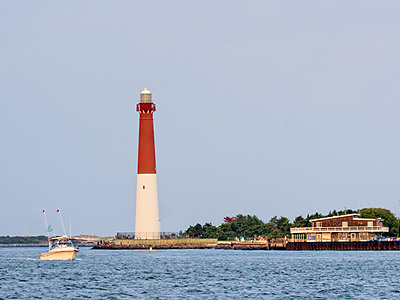
Anders Winquist-Bailey has gone fishing for the summer, courtesy of the National Science Foundation.
Winquist-Bailey, a junior biology major from Sugar Grove, is spending 10 weeks on the waters of New Jersey’s Barnegat Bay, as a summer research intern at Rutgers University’s research station in Tuckerton, part of its Institute of Marine and Coastal Sciences. He is investigating the effects of urbanization on fish populations in the salt marshes and tidal wetlands along the bay. Several times each week, Winquist-Bailey and other researchers head out on a 20-foot skiff to trawl the waters of the bay, part of an ongoing aquatic head-count that marine scientists hope will add to their understanding of the changing environment along the New Jersey coast.
Winquist-Bailey is working in Rutgers’ highly selective Research Internships in Ocean Sciences (RIOS) program, which is funded by the National Science Foundation’s Research Experiences for Undergraduates (REU) initiative. He is one of 10 students from colleges across the country working at three research sites around New Jersey. Students collaborate with Rutgers researchers and earn a $5,000 stipend. Winquist-Bailey is one of only two juniors selected; the others are rising seniors.
“I’m really excited to be doing this. It’s great exposure to the marine sciences and a way for me to meet and work with scientists in this field,” he said. “I’m learning to do independent work, to write a proposal, to execute a project.”
The work is not easy. To beat the tides, Winquist-Bailey and his fellow students have risen as early as 3:50 a.m. to get on the water before sunrise. They collect fish by dragging a net called an otter trawl, attached by a thick steel cable to the stern of their boat. They haul their catch to the deck after two minutes of trawling.
“It’s physically demanding work,” Winquist-Bailey said. “You may be on the boat for 10 hours at a time. It’s a workout, but it’s fun.”
Often working in waters no more than five feet deep, the researchers harvest a surprisingly diverse array: anchovies, blue crabs, flounder, mummichogs, even turtles. They also haul in disturbing quantities of trash—most frequently beer cans, but also, on one occasion, a fully intact plastic deck chair.
Barnegat Bay’s marshes serve as nurseries for fish seeking refuge from ocean-going predators. They also provide flood protection against rising sea levels. Data generated by the trawling expeditions will help researchers measure how development is altering the bay and its watershed. When he’s not on the water, Winquist-Bailey is back at the field station, where he gets an introduction to the use of statistics in marine science and techniques for analyzing data. He and the other interns stay in a dorm at the field station. He has found time for weekend trips to Boston and New York.
Winquist-Bailey’s interest in marine science was sparked by a first-year biology course at Elmhurst. He spent the summer between his first and sophomore years working with Assistant Professor Kyle Bennett as part of the College’s Keystone program, which provides research opportunities in math and science for students early in their undergraduate studies. Bennett is analyzing DNA from several different species of a marine mussel called Brachidontes to draw sharper distinctions among species that appear virtually identical in form and structure. In the process, he hopes to better understand how, when and why species developed and branched off from common ancestors.
Working in Bennett’s lab gave Winquist-Bailey his first taste of marine biology research. He worked on polymerase chain reactions, the biochemical technology used to generate copies of a DNA sequence for analysis.
“I learned a lot about what it means to be a scientist,” he said. “I went through a lot of trial and error, and at times it was frustrating. But Dr. Bennett would tell me, that’s exactly how science works.”
Bennett encouraged him to apply for the RIOS research experience at Rutgers. Bennett said that the NSF-funded programs “are incredibly competitive and it’s nearly unheard-of for a sophomore to get one.” But he believed that Winquist-Bailey’s work at Elmhurst and his interest in a career in marine science made him a strong candidate. “I’m sure his experiences in the Keystone program and working in my lab greatly strengthened his application, but his strong grades and general maturity were what got him in the door.”
His summer experience on the Jersey Shore has been “an eye-opener,” Winquist-Bailey said. “Just getting to work with these scientists, I’m seeing a whole other side of science. I’ve always been a math head and always liked working with data. But I’m finding out that field work is interesting, too.”
At the completion of his 10 weeks at Barnegat Bay, Winquist-Bailey will present his work to the researchers supervising him. Then he will return to Elmhurst and to Bennett’s lab, where he will tackle more problems in the DNA analysis of marine mussels.
“There are always more problems to solve,” he said.